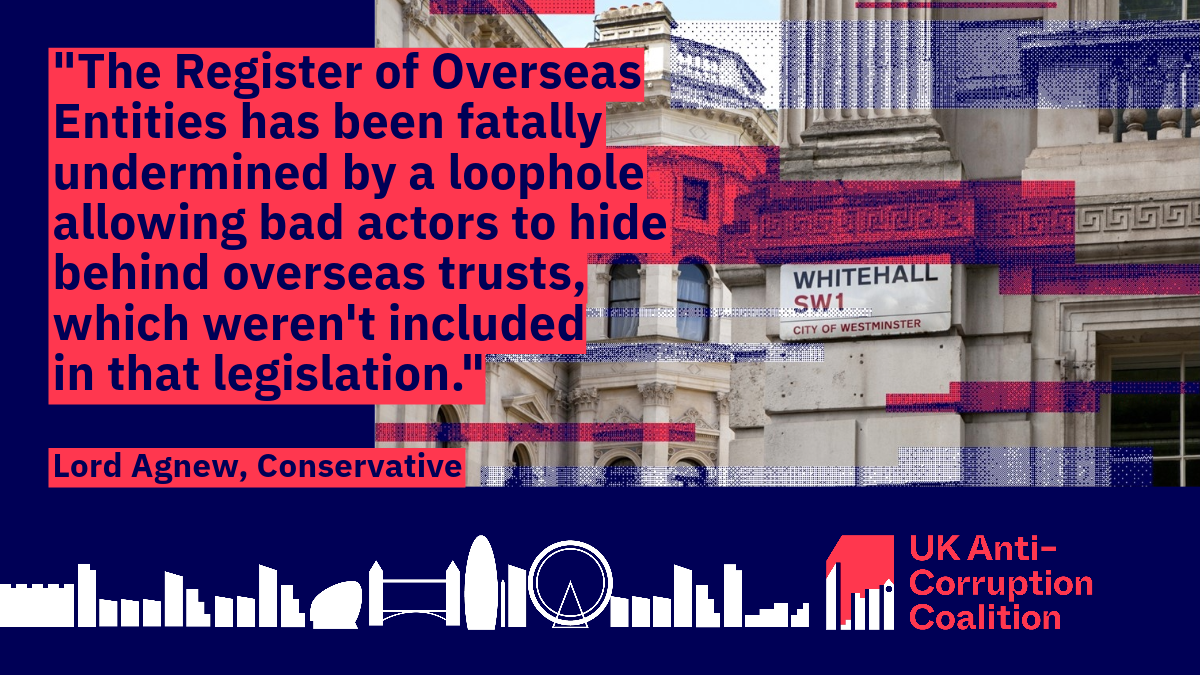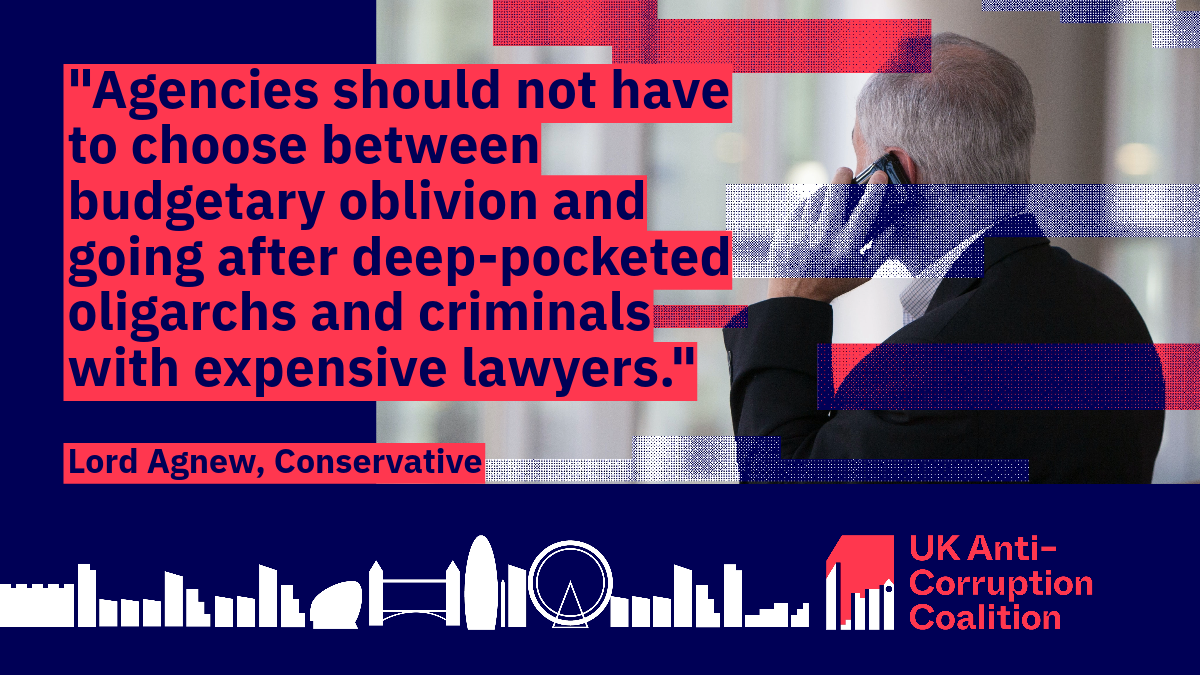Newsletter: Commons restarts with government motions rejecting crossbench Lords proposals to protect UK from dirty money
Welcome to the new, revamped UK Anti-Corruption Coalition newsletter, a regular heads-up of key stories in anti-corruption, economic crime, political integrity, procurement, sanctions and more.
First up, some big upcoming developments on the Economic Crime and Corporate Transparency Bill. During the House of Lords Report Stage in June and July, Peers voted through key amendments, most tabled by Conservatives. Each amendment would represent a huge step forward in how we approach economic crime in the UK.
However, the government has motioned that, when the Bill returns to Commons for ping-pong on 4 September, it will move largely against the Lords’ proposals, setting the scene for further ping-pong as Lords may then re-insert key amendments to defend the UK from dirty money.
Here's what the key amendments would mean in practice, how the government intends to respond, and some explainers from the parliamentarians who tabled them...
Amendment 23
(Tabled by Lord Vaux [Crossbench], formerly amendment 16)
“This would make it much easier for enforcement agencies to identify the true owners of companies…”
This amendment would make it much harder for criminals and kleptocrats to conceal their ownership of companies. In short, it would require a person or firm holding shares as a "nominee" to declare that holding, and to name the person or persons on whose behalf those shares are held. It would also introduce an offence to deter nominees from failing to declare themselves properly.
Lord Vaux commented: “Undisclosed nominee arrangements are a classic way of hiding the real ownership of a company. This amendment would mean dishonest actors will have to find people willing to lie on the record, rather than just keep quiet, completely altering their risk-reward calculations.
“This would make it much easier for enforcement agencies to identify the true owners of companies and provide a vital boost for transparency and national security, without placing an undue burden on business. In fact, without this amendment, it will actually be easier for wrongdoers to hide their ownership of UK property by using a UK company instead of an overseas entity – completely undermining the flagship Register of Overseas Entities.”
Government motion: contesting amendment.
Amendment 117
(Tabled by Lord Agnew [Con], formerly amendments 73A, 75A and 78A)
Closing a loophole that allows bad actors to continue hiding behind offshore companies.
To further improve transparency on who owns properties via offshore companies, this amendment would close a loophole in an earlier piece of legislation that was expedited through parliament following Russia's illegal war in Ukraine.
Lord Agnew said: “The last Economic Crime Bill introduced the Register of Overseas Entities to list who owns property via offshore companies. But this has been fatally undermined by a loophole allowing bad actors to hide from scrutiny using overseas trusts, which weren't included in that legislation. By making it a requirement to publish information on trustees, we'd have a much better picture of who's acquiring and holding UK property.
BACKGROUND: Research shows £40bn of property owned by offshore tax haven firms
Government motion: contesting amendment.
Amendment 151
(Tabled by Lord Garnier [Con], formerly amendment 110)
“Prosecutions should be based on the evidence of wrongdoing and on the public interest in a prosecution – not on the size of the suspect.”
The government has proposed some limitations on its new “failure to prevent” fraud offence. This offence would, in theory, make it much harder for professionals, like bankers and accountants, to simply turn a blind eye to clients’ wrongdoing, because they would have a new legal responsibility to carry out proper checks. The government, however, has proposed making small-and-medium-sized enterprises (SMEs) exempt from this new offence, despite SMEs being disproportionately likely to be either victims of, or vehicles for, fraud.
Amendment 151 would remove the SME exemption, and make the rules the same for all.
Lord Garnier explained: “The Government’s SME exemption is not just bad law, it’s ridiculous. We don’t prosecute only burglars over 6’6” and let off 99.5% of burglars because they are shorter than that. The criminal offence of failure to prevent fraud and money laundering should be the same for all companies and of burglary for all burglars. Prosecutions should be based on the evidence of wrongdoing and on the public interest in a prosecution, not on the size of the suspect. After all, small burglars can cause as much harm and misery as tall ones.”
Government motion: contesting SME exemption amendment; UK Govt in favour of “failure to prevent” being extended to fraud offences but only for “large organisation(s)”.
Amendment 159
(Tabled by Lord Garnier [Con], formerly amendment 125)
“No properly run company of any size would want to promote… money laundering by anyone it deals with.”
This amendment would extend the new 'failure to prevent' fraud provision (see also “Amendment 151”) to include money laundering. Money laundering is estimated to cost the UK some £100bn annually.
Lord Garnier said: “The Government has failed to provide a rational, legally coherent, evidence-based argument against the case for extending the failure to prevent regime to money laundering. They have themselves extended it to fraud offences in line with the longstanding offences of failure to prevent bribery and tax evasion so there is no principle at stake here.”
He added: “Amendments 151 and 159 are not anti-business; they’re pro-honest business – and honest business leads to repeat business. No properly run company of any size would want to promote or permit corruption or money laundering by anyone it deals with. Requiring all companies to have adequate procedures to prevent fraud and money laundering is not an imposition but common sense.”
Government motion: contesting amendment.
Amendment 161
(Tabled by Lord Agnew [Con], formerly amendment 129)
Giving law enforcement more confidence to go after “deep-pocketed oligarchs and criminals with expensive lawyers.”
This amendment would limit the court costs that law enforcement agencies can be liable for when they're pursuing economic crime cases. Super-rich individuals, like foreign oligarchs, have in the past relied on simply racking up unaffordable costs to evade prosecution. The chilling effect of potentially losing an entire year’s budget on one lost case is highly damaging to the fight against economic crime.
As Lord Agnew explained, “We already have protections from exorbitant court costs for our enforcement agencies when pursuing Unexplained Wealth Orders. This new amendment would simply extend this principle across different civil recovery cases. Agencies should not have to choose between budgetary oblivion and going after deep-pocketed oligarchs and criminals with expensive lawyers.”
Government motion: will move an amendment in lieu of the Lords’ amendment, to produce a report within 12 months on the benefits of this type of cost capping.
“Parliamentarians of all stripes have come together…”
Commenting on the government motions against these amendments, senior Labour backbencher and long-time anti-corruption campaigner Margaret Hodge MP said: “These practical changes would make it harder for Putin’s cronies to hide behind layers of financial secrecy. They would make it harder for people traffickers and drug smugglers to launder the proceeds of their crimes into our country. And they would make it easier for our outgunned and outspent enforcement agencies to go after these crooks and kleptocrats.
“Parliamentarians and experts of all stripes have come together to develop a strong, coherent and effective set of proposals. The Government still has a chance to think again. I would urge them to do so.”





